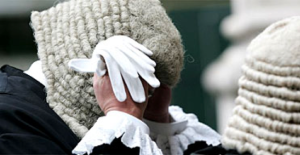
Some may claim that what follows is palpably not a victory for justice. Whilst RM is entirely sympathetic to the view that it is not possible for a man to attain justice in the rigged casino known as Her Maj’s Courts and Tribunal Service [HMCTS], where such is the desperation to conceal any fraud perpetuated by any white collar criminal who is connected in some way to one of the House of Rothschild’s banks, all manner of sophistry and obfuscation will be employed by the BAR members to obstruct the course of justice, the following account deals with the facts of the matter only, which, with all due to respect, is in marked contrast to the way the ‘honourable’ judge presided.
In plain terms: when a judge operating in one of the Rothschildean Casino Courts demonstrably fails to provide a competent jurisdiction for a matter to be heard and settled, the resultant judgement will be incurably void, regardless of what any naysayers may fallaciously claim. There is nothing at law that can be done to a thing that is void to make it somehow valid. One cannot polish a turd. In any event, the facts were established in the High Court by the Claimant and now exist as a matter of public record.
RM realises too just how deep the fallacy of the appeal to authority goes. Many will wrongly believe that the judge was a wise man who knows the law and ruled correctly. However, when dealing with the facts of the matter, it becomes crystal clear that was not the case here. When a man acting as a judge rules in favour of deep collective denial and obfuscation against the established facts of the professional negligence of a manifestly reckless conveyancing solicitor, it means that at some point, his false ruling will crumble to dust.
In the simplest of terms, being based on falsehood, it will wither and die to nothingness because that is all it ever could be.
When individuals begin to think for themselves and drop the phoney notion that those in positions of so-called authority are always correct, then the writing is on the wall for all those false believers in the God of the State who mistakenly rely upon the fallacy of the appeal to authority. For these reasons, the discerning reader is encouraged to focus on the facts of this matter. A sanitised copy of the Claimant’s Statement of Case is attached below in order to illustrate the nature of a valid negligence claim that was unrebutted in court and therefore stands as one which may be used as a template for any mortgagor who has had his home stolen as a consequence of him being falsely advised by his conveyancing solicitor that the mortgage agreement and deed were valid when they were self-evidently nothing less than a lie put to paper.
Wherefore, on Friday, 27 February, 2015, at the Queen’s Bench sitting at Nottingham County Court before Mr Justice Cranston, it was established that a mortgagor who has been negligently and falsely advised that his mortgage agreement with the purported lender was legal has a valid cause of action for a damages claim against that individual under the tort of negligence, if he makes it within 15 years of the negligence.
Background
Following the failure of the Defendant (a conveyancing solicitor who was paid for his legal advice by the Claimant over a mortgage agreement and deed which both were subsequently proven to be void) to settle a self-evidently valid Negligence Claim by way of private settlement via his professional indemnification insurance policy, a tort of negligence claim was filed at Nottingham County Court on 25 October, 2014, against the negligent solicitor and three other defendants who had been drawn into the insurance fraud. A sanitised version of the letter of claim can be read here.
The Defendants failed to file a defence within the 28 days and, instead, made an unmeritorious application on 28 November for the negligence claim to be dismissed.
A hearing was scheduled for 23 January, 2015. When HHJ Nigel Godsmark, the senior Judge at Nottingham County Court realised that he knew the first three defendants (all solicitors, operating out of a firm in the city), he recused himself from the proceedings.

At the directions hearing on that day, the matter was transferred to the Queen’s Bench Division of the High Court, with the agreement of both parties. Joseph Sullivan, the barrister, announced he would be seeking the issuance of an Extended Civil Restraining Order banning the claimant from access to the Courts on the fallacious ground that the Claimant had run out of time under the Statute of Limitations Act and was a vexatious litigant – a tactic that had been used against the Claimant before in 2010 when he was fighting a fraudulent possession claim by the Bradford & Bingley Plc that had been initiated in July 2009.
Said barrister was also seeking an order that the expert witness testimony of the forensic economist, Timothy Madden, made in the shape of a detailed dissection of the void components of the mortgage agreement, be struck out even though he had been appointed as such back in October 2013, as established by the private correspondence of the parties.
The hearing of the two applications was scheduled for Friday, 27 February, to be heard before Judge Nicol, as confirmed at the directions hearing by HHJ Godsmark. The hearing in QB was of two applications. The first, an application by the Defendants’ Barrister to have the claim struck out as being without merit on the false grounds it was out of time under the Statute of Limitations, along with the request for the inclusion of the expert witness report of Timothy Madden. The second application being that of the Claimant to have the defendants’ application dismissed as being without merit.
As previously stated, this first hand account is one that is concerned with the facts only, the intention being to focus not on the failings of the judiciary and the sophistry of the highly paid barrister but on the bigger picture: what was factually established is simply that which remains standing after the voluminous waves of bullshit have subsided.
With that in mind, let’s make a factual note:
the Cause of action for a negligence claim does not begin until damages have been inflicted – in this particular case, all of the elements of a breach of duty by the conveyancing solicitor were in place (duty, breach and damage) when the house was stolen on 04 November, 2010, and not as falsely claimed by the D’s dissembling sophist and barrister, in 2009 when the Claimant defended a fraudulent possession claim by the Bradford and Bingley and its agents.
Not until the elements of the negligence were present was there a valid claim…that occurred when the house was forcibly stolen. In other words, the clock only started ticking at that point. The Barrister falsely claimed that the statute of limitations had to be applied from the date the void mortgage was created (08 August, 1994).
That was the sophistry of hand that was played by the barrister that resulted in an unsafe judgement being delivered.
sophistry |ˈsäfəstrē|
noun (pl. sophistries)
the use of fallacious arguments, especially with the intention of deceiving.
• a fallacious argument.
The discerning reader will note that when one’s opponent is attempting to use sophisticated arguments (or lies as some may prefer to call them), the individual’s only defence is his capacity for reason – in other words, critical thinking which can be used to break down any and all fallacies that are being used against him.
The more one thinks about this, the more one sees for oneself that the most expensive barristers are quite simply those who are the best deceivers. Remember too, whilst prostitution is legal, soliciting remains illegal. Members of the legal professions are encouraged to make of that what they will.
Another fact that requires some critical thinking is this. It was only 3 days after the hearing of 27 February, 2015 that it came to the Claimant’s attention that it was, in fact, not the aforementioned Judge Nicol but another judge of the Queen’s Bench who had presided at the hearing: “Sir Ross Frederick Cranston (born 23 July 1948 in Brisbane, Australia), styled The Hon. Mr Justice Cranston, who is a High Court judge, formerly an academic lawyer and Labour Party politician, in the United Kingdom.”
At no point prior to that did the court, the barrister for the defendants or indeed the man himself identify himself as Mr Justice Cranston. The discerning reader is asked to make of that what he will.

It is also worth noting that Ross Cranston has considerable academic experience and ‘expertise’ in financial matters:
“He is also a Visiting Professor of Law at the London School of Economics and Political Science. He was a member of the House of Commons in the United Kingdom from 1997-2005. He was Solicitor General from 1998-2001. Previously he was Centennial Professor and Cassel Professor of Commercial Law at LSE. Before that he was Lubbock Professor of Banking Law and Director of the Centre for Commercial Law Studies at Queen Mary & Westfield College. He was educated in Australia and at Harvard Law School and Oxford. He has held consultancies with UNCTAD, the World Bank, the IMF and the Commonwealth Secretariat to advise different countries on commercial, banking and securities laws. He has also undertaken peer reviews of the legal system for the European Commission in Bulgaria, Croatia and Turkey. He was a long time member of the legal advisory panel of the National Consumer Council in Britain until 1997 and chair of trustees of the whistleblower’s charity, Public Concern at Work. He is a Fellow of the British Academy.” SOURCE
His book, ‘Principles of Banking Law’, is described thus,
“Written by a leading figure in the field, this book provides the most authoritative treatment of international banking and services law, with in-depth expert coverage of global banking regulation, global payment systems, international bond instruments and foreign exchange systems. Unlike other texts, Cranston takes an international perspective on the subject, thus helping locate domestic banking/financial law in its wider context….”
Sir Ross Cranston, therefore, was Solicitor General to Tony Blair, and, as deputy to the Attorney General, was the one who provided legal advice to the cabinet between 1998 and 2001 when he was succeeded by Harriet Harman. Little wonder, one might say, that he chose to ignore the salient fact that the deed of mortgage, a valuable negotiable financial instrument procured by way of the demonstrably negligent advice of the Defendant, was an on-its-face false document that fell foul of the Law of Mortgages.
Just like those before him, the judge went nowhere near the ‘meat’ of the Claimant’s argument, choosing instead to rely upon the misrepresentations of the Defendant’s barrister who, by employing what was essentially a sophist approach, sold him the lie that the Claimant was time-barred from bringing the negligence claim. By buying that lie, the ‘Professor’ erred in law.
Given the foregoing, it is hardly surprising then that the softly-spoken Joseph Sullivan seemed content to rely entirely upon the claim being falsely dismissed as being out of time and went nowhere near a rebuttal of the Claimant’s argument about the fatal defects of the Deed of Mortgage itself and the conveyancing solicitor’s blatant negligence by way of his omissions to point out those material defects as well as the self-evident statutory failures of the bank under the Law of Property (Miscellaneous Provisions) Act 1989, sections 1 and 2.
The salient point is this: who in his right mind would enter a mortgage agreement that is fraudulent on its face other than when negligently-advised by a solicitor who, unbeknownst to the duped punter, is simultaneously being paid by the alleged lender for his procurement of the valuable security, the deed of mortgage, which is essentially a cash asset to the bank?
And this, lest the reader forgets, is the very nub of the matter: for without said false advice that the mortgage was legal, would the ‘mortgagor’ have suffered any losses by way of payments made under an invalid mortgage agreement?
And, was it not the fact of the void agreement for a mortgage, as entered upon the Defendant’s false assurance that it was valid, that led to the fraudulent possession claim being made against him, that led, in turn, to the violent theft of his house?
Why didn’t the solicitor reveal at the time of his working for the Claimant that he was also being paid by the alleged lender? Could it be he wished to hide the fact of this blatant conflict of interest from the Claimant?

In any event, let’s focus on what was established at the hearing of 27 February, 2015:
- There was no rebuttal of the facts of the void mortgage – the falsity of the documentation, the failure of the Defendant to point out the legal omissions of both the deed and the mortgage contract under s. 2 of the LP Act 1989.
- The judge erred in law by falsely ruling that the Claimant was statute barred from bringing the negligence claim as it had to fall within 15 years of the negligent act.
- A negligence claim is valid when all its elements are there: duty of care, breach of duty of care and loss, which for a survivor of TGBMS, is the day the house is stolen.
- A mortgagor can rely upon the defects of the Deed of Mortgage, as per BOS vs Waugh [2014]
- A negligent solicitor cannot rely upon the fallacy of common practice when that common practice is industry-wide.
- By ignoring the ‘meat’ of the Claimant’s argument, the Judge failed to provide a competent jurisdiction, choosing instead to rely upon the false argument of the Defendants’ barrister that the claim was statute barred under the Statute of Limitations Act, 1980.
- By not disclosing to the Claimant who he was, the C was put at a disadvantage to the Barrister who evidently knew in advance who the Judge was.
All of which leads us to a series of pertinent questions…
- Given his ministerial role in the criminal government of Tony Blair in which he was Solicitor General, could Ross Cranston be deemed impartial enough to preside over a matter as significant as the Great British Mortgage Swindle?
- Why did he ignore the factual defects of the mortgage and those authorities by which the court is bound?
- Why did he not provide any substantive reasoning as to how and why the negligence claim was without merit?
- Why was he chosen to preside over this matter and why was the Claimant not informed of his appointment in advance, as the Defendants seemingly were?
- Why is the judiciary seeking to ban the Claimant from the Courts for a second time?
- Has the (Rothschildean) Courts service once again failed under international law to provide a competent jurisdiction?
- How can a claim that potentially affects 40 million people across the Isles of Britain be possibly dismissed as being without merit?

Conclusion: the entire conveyancing industry is teetering on the brink of collapse. Like a pair of Dutch schoolboys, the judge and barrister were attempting the impossible: there are not enough fingers on Earth to plug the glaring holes in this huge dam wall that is spouting leaks at all points and, sooner than later, the whole edifice will burst. This is what the Judge and Barrister were so keen to hide. Remember, at no point was the claimant’s argument dismissed as being without merit. In any event, and as stated on the public record by the Claimant,
there is no statutory limit on an act of professional negligence that leads to fraud and criminality against someone. How could there be?”
There was no premise for striking out the negligence claim as being without merit , so the barrister and the judge had to cook one up.
This imminent collapse is simply too enormous for the legal profession to acknowledge which is why, as demonstrated by the void nature of Ross Cranston’s judgement, they and their cohorts are in deep denial.
Sadly and, contrary to the disingenuous mutterings of the expensive barrister, judgements like this bring the judiciary into disrepute – as stated by the claimant when the false accusation was leveled at him, it is not he that that has brought about any disrepute, rather it is each and every judge across the Isles of Britain who has failed to apply the Law of Mortgages since 26 September, 1989.
As he made clear on the court record,
To suggest I have brought the British judiciary into disrepute is like blaming a mafia victim for his own murder”
an analogy for sure, but one which nevertheless is applicable to a matter in which a man was subjected to a genocidal and wholly unlawful eviction.
As said record will demonstrate, the Judge was overly preoccupied with establishing that the claim was time barred so he could strike out a valid negligence claim that is of interest to over 11 million mortgagors in the British Isles alone, hence his constant interruption with questions regarding the chronology of proceedings.
In so doing, he ignored the proven elements of the Defendants’ negligence and wrongly asserted the negligence claim was time barred in so far as the Claimant should have raised the issues in previous hearings in 2009 which was some years prior to his discovery of further information and the moment when, as a matter of fact all the elements of the woeful negligence were in place. (04 November, 2010)
In short, although it was another void judgement which further perverts the course of justice and serves, as ever, only the vested interests of the criminal Rothschildean financial establishment and those members of the legal profession who sup from its poisonous chalice, the validity of the claim against the conveyancing solicitor for his manifest professional negligence in falsely advising that the mortgage was lawful was sound. None of its factual elements were rebutted.
The levels of judicial misconduct by those judges who fail to apply the law in any and all fraudulent mortgage claims made by phoney lenders and their whoring solicitors is the huge scandal that implicates them in the treachery that is THE GREAT BRITISH MORTGAGE SWINDLE.

Pingback: TGBMS: the Fraud of Antonio Horta-Osorio. - ROGUE MALE